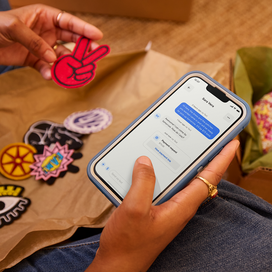Table of contents
Today’s consumers expect more than simply buying a product at the right price — they expect access to comprehensive information about the product or service they’re purchasing, and a frictionless purchasing experience. Customer service plays a major role in this buying journey. Customers expect businesses to address the questions or concerns that may arise — no matter what time of day or what day of the week. In an increasingly competitive retail environment, brands must strive to meet these expectations or risk losing sales and customers.
As customer expectations evolve, brands and retailers invest in building stronger relationships with them. The relationship between brand and consumer must go far beyond sales transactions. To create trust and loyalty, businesses must provide exemplary customer service throughout their customers’ lifetimes. And to build and maintain those relationships, forward-thinking brands are enhancing their customer service by using conversational commerce. According to the Square Future Of Commerce report, 41% of retailers say they currently, or plan to, implement selling via text or chat.
The importance of conversational commerce
Conversational commerce is a new form of online interaction between brands and consumers, allowing both to communicate directly via text or voice. Push notifications and tools such as Square Messages allow businesses to communicate with customers about sales and product launches, while chatbots make it easy for consumers to ask a question 24/7, such as the location of a delivery.
Conversational commerce allows brands to respond directly, which consumers say is critical. In one survey, 69% of consumers said being able to message a brand made them feel more confident, indicating that the speed of response is vital. The same survey found that 70% of businesses that respond to consumer chats within five minutes were more likely to lead to conversion.
It’s not always easy to achieve a response that fast. While customers say they’re willing to wait an average of six minutes, the actual average wait time is 17 minutes. And when consumers feel they’ve had a bad experience, they are not shy about expressing this. More than half of Gen Z consumers (65%) are likely to leave a negative online review and abandon a brand if they’ve had a bad customer experience.
As businesses face heightened consumer expectations and increased competition, the pressure is on to develop and maintain strong customer relationships. Conversational commerce can help.
Five ways conversational commerce strengthens customer relationships
- Supports customer questions and any issues that arise: Even when brands have live customer service centers, many aren’t available 24/7. Yet, when a prospective customer has a question or a current one has a concern, they want an answer immediately. Insisting a customer wait until “business hours’’ may lead to a lost customer and lost sales. Offering conversational commerce gives customers the assurance that they’ll make progress on their issue, even if it occurs during holidays or overnight hours.
- Helps businesses be responsive without getting overwhelmed: It can be impossible to respond to every customer inquiry and still ensure the brand or business moves forward. Using automated tools and messaging chatbots helps address basic customer questions and allows brands the time to provide great customer service, especially on more complicated issues customers may have.
- Applicable across business sizes: Whether a brand is a one-person shop or a global entity, business owners must balance taking care of their customers with taking care of the business. Being able to scale responsiveness ensures brands can maintain strong customer relationships as they grow.
- Uses automated tools, such as Square Assistant, so customers can make and confirm appointments: This frees businesses from the busy work but makes it simpler for customers to set or change their schedules, decreasing the chances of no-shows.
- Stores all of your conversations in one place: With Square Messages, you have all customer conversations in one place, making it easier to communicate with customers more efficiently. Notifications and chats can be attached to invoices or shipping data, so customers also have a history of their transactions. This process makes it easier to reference and address any customer service issues.
As brands look for ways to connect with their customers, conversational commerce helps manage customer interactions at scale, ensuring consumers get assistance whenever they need it, building stronger customer relationships every step of the way.
![]()











